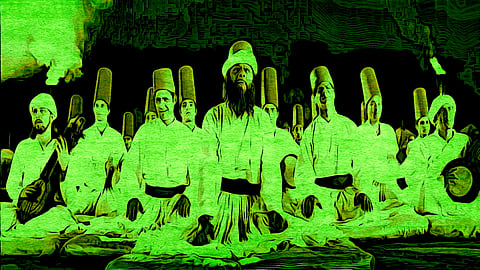- Commentary
- History Vignettes
- Notes on Culture
- Dispatches
- Podcasts
- Indian LanguagesIndian Languages
- Support

From time immemorial, music has been the carrier of data of different kinds. It carried lyrics, emotions, and spiritual energy. When music becomes the companion of poetry, things which the latter cannot achieve alone, are achieved.
We know the impact of music in generating a range of emotions that are both positive and negative. Several instances in history, numerous kings recognized this innate power of music and banned it in kingdom. But in the history of world religions, Mohammed prohibited music in Islām and lay it down as a diktat for his followers. Here is a quote that exposes the fundamental hatred in Islām for music:
Imam Ja'far ibn Muhammad as-Sadiq writes:
Despite this stricture, in India, we have a long list of Muslim cinema music directors and singers who went on to achieve fame, popularity and wealth. This list includes but is not limited to Naushad Ali, Mohammad Rafi, and A R Rehman. Which raises a logical question: are these eminences Muslims and if they are, aren’t they committing harām? They can’t have it both ways. At any rate, the hypocrisy is clear.
It is an observable fact of recent history that where money and politics are concerned, such strictures of Islām take a back seat for most such Muslims who show no qualms in earning from the so-called harām practices and pass on the proceeds elsewhere. The fakery of “Sufi music,” which is based on Indian classical rāga-s is actually a conduit for making money and Islamise India in subtle and unsubtle ways.
A survey of the revenue generated by the Bollywood music industry for the period from 2014 to 2020, published in September 2020, by Statista reads as follows:
The revenue generated from music rights of Indian films was around FOUR BILLION INDIAN RUPEES. This was estimated to go up to over five billion rupees by the end of fiscal year 2024. Even though the Indian music industry is big in itself, almost 80 percent of its revenue comes from Bollywood music, followed by Indi-pop genre.
The report further states, ‘Domestic films released across India generated a revenue of over 122 billion Indian rupees across theatres and cinemas in financial year 2020.’
While unsuspecting Sanatanis accept Sufism as a neutral and spiritual aspect of Islām, it is in reality, a missionary activity as the scholar Arnold (1912) says:
The spread of Islām over so vast a portion of the globe is due to various causes, social, political and religious: but among these, one of the stupendous results, has been the unremitted labours of Muslim missionaries, who, with the Prophet himself as their great ensemble, have spent themselves for the conversion of unbelievers.
Throughout their history, Sufis wielded great political power and were deeply involved in the socio-political decisions of the Islamic invaders everywhere.[1] Note that ‘unbelievers’ in Islām are known as Kafirs and death or conversion to Islām are the only alternatives for a Kafir. But how did the Sufis enter India? The well-known answer: with the so-called Delhi Sultanate. Wherever Sufis have gone, they appropriate the local music, but infuse it with their own lyrics with an aim of converting Hindus.
A good number of Kashmiri Hindus were converted by Sufis into Islām, writes Malik giving it a different turn. He writes that it was because “they were convinced by the Sufis about the humane and peaceful religion of Islam and the false beliefs in their practices, the Hindus converted.”
First, if Sufis were not bigoted missionaries, why would they convert Hindus? And if they taught them peace, love, and spirituality, why did the Kashmiri Muslims kill and rape Hindus and throw them out of Kashmir? I assume that Sufis taught them this hatred and Jihad which is seldom brought out in mainstream narratives about Sufis. So, whatever the original form of Sufi, they were basically missionaries and not broad minded, they were not the “tolerant” section within Islām as is commonly believed.
As such, the Sufis in India masquerading as great lovers of the arts have been pumped into Indian cinema, especially in Bollywood, to spread Islām. The huge money that is drawn from cinema music and from albums is not entirely clean.
The Dharma Dispatch is now available on Telegram! For original and insightful narratives on Indian Culture and History, subscribe to us on Telegram.
